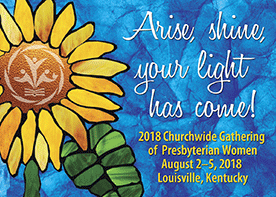An invitation to Come to the Waters
By Yvonne Hileman
Judy Record Fletcher, author of the 2015–2016 PW/Horizons Bible study, introduced herself to Gathering attendees on Saturday morning's plenary session during the 2015 Churchwide Gathering of Presbyterian Women. "I am honored to be the author of your Horizons Bible Study," she said before recounting her decades-long interactions with and support for Presbyterian Women. She reflected on water in the Bible. "The Bible includes over 800 references to water. The presence of water is seen as a blessing from God and the absence of water is seen as a part of the wrath or judgment of God. The subject of water can be seen as a unifying theme in both the Old and New Testaments."
She went on to say that while modern-day water issues are only one lesson in the Bible study, a lack of access to clean water heavily shapes the lives of millions around the world. She noted that 750 million people lack access to safe or clean water, and yet plastic water bottles are the largest source of trash in the water. She urged Presbyterian Women to learn about modern water issues with the study. She urged awareness "not to heap guilt . . . . but to learn the things we can do, both large and small, to improve this situation and make a positive difference."
Judy also led two workshops at the Gathering—both to rooms packed with more than 200 Gathering attendees. She spoke with women about how to teach the study, and walked them through it one lesson at a time, offering insights into how she chose lessons and examples. In her warm and engaging manner, she remarked that she loves multicultural gatherings “because that’s where I get a vision of heaven!”
She urged workshop attendees to engage the members of their study circles, in such practical ways as having them bring images of water to their study of the first lesson, and researching, then sharing facts about water resources throughout the course of the study. She pointed out that in the study, she does not mention studying modern water issues until later in the study, but says there is so much to know, she now recommends introducing them sooner.
At the same time, she reminded Bible study leaders to be sensitive as they introduce water images, because some folks have had traumatic experiences with water. For example, she said, some people may have experienced water in a flood or a fire. This sensitivity was a hallmark of her approach to leading the study.
Not without levity, she approached Lesson Three with a bit of humor. She said she almost called it “Thirsty people behaving badly.” And the lesson there, she said, is the faithfulness of God and God’s enduring presence. But, she said, we don’t know how we’d respond in the same situation. She cited the anxiety and fear that pervaded the Superdome while New Orleans was flooded in the aftermath of Hurricane Katrina. She named the blessing of people in that situation coming to one another’s aid, noting “But we don’t hear as much about those.”
Judy brought each lesson to life, setting it on firm theological ground and relating it to our lives. For example, when talking about a thirst for community, she called to mind people who live alone, people who have few connections and thirst for someone to talk to. “Remember when we used our porches and visited our neighbors?” She said social researchers blame television and air conditioning, but “We have to pay attention to those who are thirsty for community.”
She talked about “heavy” things, like eroding trust and thirst for community, but said, “We have to deal with these things. We must do things differently.” In talking about Lesson Five and too much water, the waters of chaos, she referred to her own feeling of being overwhelmed, of feeling as though she were drowning. Her approach to Bible study is very human and in this workshop, she showed hundreds of women that they, too, can bring the scripture to life.
Learn more about Come to the Waters and the resources available to promote it.

